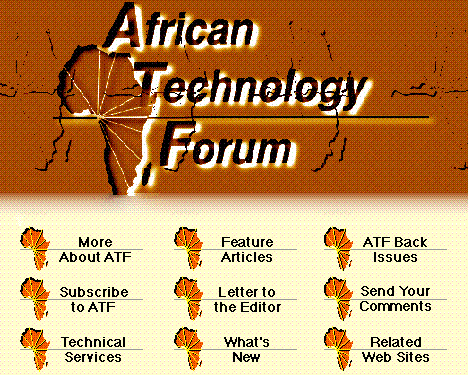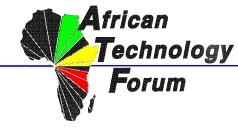Looking back: African Technology Forum
Does the African Technology Forum, once so active 20 years ago, remain active to this day? The answer, unfortunately is “no”. The current site saw a handful of articles posted last year, but they were few and far between. Plus, the self-hosted version of the site is essentially the same as the 1995-8 archived version on the MIT servers.
Still, the organization served a key role in stimulating technological advancement in Africa during the early 1990’s. Started in 1988 by only a handful of MIT students, by 1992 ATF boasted a volunteer staff of about 23, contributors in 15 countries, and a readership of over 11,000. During the mid-1990’s ATF served mainly as a consulting platform, especially in nations like Ghana and Cape Verde. Very impressive, indeed.
At one point, ATF produced a quarterly publication aimed at providing an essential communication link between African engineers, scientists, and policy makers, and their counterparts in Europe, Asia and the Americas. Its goal was to provide a forum for discovering how technological advances could be adapted to promote the lives of the people of Africa, taking into account the social and cultural dimensions of technological change. Each edition (there were at least 7 of them from 1993-1995) contained a variety of articles from different authors. The topics covered and the reach of these articles still function as 1) a reminder of how far Africa has come and 2) how interested early Internet users were in science and Africa (11,000 readers in 1992 is no small feat).
Volume 8, Number 1 (1998)
- “Increasing Computer Literacy in Africa“: The International Development of Computer Education (IDCE) program provided over 100 computers each to Ghana, Kenya, and Zimbabwe. The program advised that computer skills are just as important in the education of young people as they are to those in business.
Volume 7, Number 2 (1994)
- “AT&T Promises Clear Phone Lines for Africa”: The company proposed a multi-billion dollar scheme to put Africa’s communications at the forefront of any system in place at the time.
- “Internetworking with TCP/IP”: A simple explanation of how to set-up an internet system.
- “Computers Empower Independent Newspapers in Cameroun”: Press freedom brought new opportunities via the Internet.
- “What Does Appropriate Technology Mean to You?”: Technology should be used to solve problems in specific contexts.
Volume 7, Number 1 (1994)
- “Privatization in Africa” and “Methods of Privatization”: Despite recommendations to privatize industry, African efforts were at a standstill.
- “Why Governments Need Access to Computer Networks [Part 2]”
Volume 6, Number 3 (1993)
- “Why Governments Need Access to Computer Networks [Part 1]”
- “Computer Networks and African Studies Centers”: Argued why the twelve African Studies Centers funded by the U.S. Department of Education should be on the “cutting edge” of contemporary electronic communication.
Volume 6, Number 2 (1993)
- “Telecommunications in Ghana”
- “Educational Communications for African development”
- “Getting Connected: Access to International Data Banks”
- “Using your computer”














 Twitter
Twitter Facebook
Facebook Pinterest
Pinterest